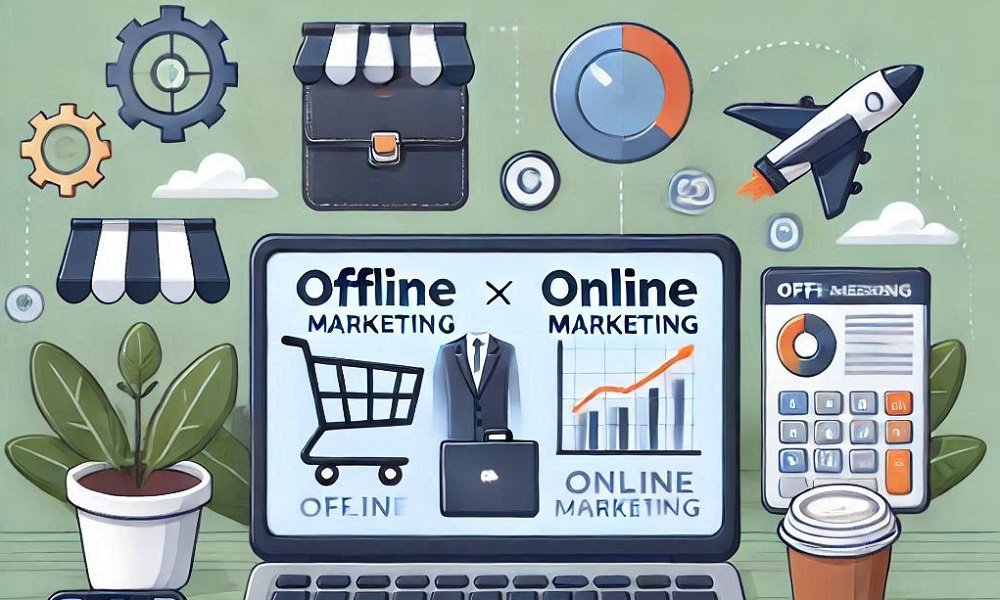Looking for offline marketing vs online marketing guide?
The modern landscape of business promotion enables companies to utilize two primary channels – online marketing and offline marketing. The ultimate goal of increased reach, sales, recognition, and value remains the same for both.
However, the two have unique advantages and challenges, requiring you to understand differences. It’s impossible to craft an effective marketing strategy without them. And this article brings up their key differences with real-life examples.
What is Offline Marketing?
It refers to traditional promotional strategies that do not involve the Internet. Those founded the basics of advertising decades ago and will remain relevant in certain industries and demographics. Some common examples of offline marketing include –
- Print Advertising – Newspapers, magazines, and flyers.
- Broadcast Advertising – TV and radio commercials.
- Outdoor Advertising – Billboards, posters, and banners.
- Direct Mail – Postcards, brochures, and catalogues sent via postal mail.
- Event Marketing – Trade shows, exhibitions, and networking events.
Advantages of Offline Marketing
- Tangibility – Print materials and direct mail create a physical presence to leave a lasting impression. Example: A high-quality brochure or magazine ad can enhance brand credibility.
- Builds Local Presence – Offline marketing methods like community events or newspaper ads are effective for local businesses. For example, a restaurant advertises in the local weekly magazine or sponsors a charity event.
- Reaches Non-Digital Audiences – Some demographics, like older generations or rural populations, are less active online and more reachable offline.
- Trustworthiness – Traditional media (TV and print ads) are often perceived as more credible than online ads, which may sometimes be seen as intrusive or suspicious.
Disadvantages of Offline Marketing
- High Costs – TV and radio ads require significant upfront investments.
- Limited Tracking – Measuring the impact of offline campaigns is challenging.
- Short Lifespan – Print materials/ads have a finite period of influence.
What is Online Marketing?
Also known as digital marketing, it uses the internet and digital tech to promote products/services. It has become the dominant approach due to the universality of smart devices as well as social media. Several leading examples of online marketing would be –
- Search Engine Optimization (SEO) – Optimizing sites to rank higher on search engines.
- Social Media Marketing – Promoting on Facebook, Instagram, LinkedIn, Twitter (X), etc.
- Content Marketing – Creating blogs, videos, and infographics to engage the audience.
- Email Marketing – Sending targeted messages on various facts to potential customers.
- Pay-Per-Click Advertising (PPC) – Ads on platforms like Google Ads and Facebook Ads.
Advantages of Online Marketing
- Cost-Effectiveness – Online campaigns can be tailored to fit any budget. Businesses can start small and scale up based on performance. Example: A small business can use free social media tools to reach clients.
- Advanced Analytics – Real-time tracking allows businesses to optimize campaigns on the go. Example: A company can pause a poorly performing Google Ads campaign and reallocate the budget to a more effective strategy.
- Personalization and Targeting – Online marketing enables precise targeting (showing ads to someone searching for specific keywords). Example: Retargeting ads that display products a user viewed on an e-commerce site.
- Engagement and Interactivity– Social media platforms let businesses interact with audiences, answer questions, and build relationships. Example: A company hosting a live Q&A session on FB to address customer queries.
Disadvantages of Online Marketing
- Digital Overload– Users are bombarded with online ads daily, leading to ad fatigue (banner blindness), where users ignore display ads on websites.
- Security and Privacy Concerns – Users may hesitate to engage with brands due to data privacy issues.
- Dependence on Technology– Online marketing campaigns rely on stable internet connections and platforms. Any outage can disrupt campaigns.
Key Differences Between Offline and Online Marketing
01. Reach and Accessibility
Offline – Limited to specific geographic regions or demographics, depending on the medium used.
Online– Global reach, allowing businesses to target audiences worldwide instantly.
02. Cost
Offline – More expensive due to production and distribution costs (printing flyers, TV ads, etc.).
Online– More cost-effective with options to start campaigns on a small budget (social media ads).
03. Measurability
Offline– Difficult to measure exact ROI where metrics are often inferred (sales spikes after TV ads).
Online– Highly measurable tools like Google Analytics and Facebook Insights can track the metrics.
04. Interaction with Audience
Offline– Primarily one-way communication with limited options for instant feedback/interaction.
Online– Interactive and dynamic to allow real-time engagement via comments, likes, and shares.
05. Customization and Targeting
Offline– Limited targeting options with mass marketing strategies are more common.
Online– Advanced targeting based on demographics, behaviour, interests, and more.
Which Strategy is Right for You?
The choice between offline and online marketing depends on factors like target audience, budget, and business goals.
Offline Marketing is ideal for businesses targeting local or less tech-savvy audiences. Meanwhile, online Marketing is better suited for reaching global audiences and achieving precise targeting.
Offline as well as online marketing have distinct roles in modern businesses’ promotional strategies. While offline marketing excels in building trust and local presence, online marketing offers scalability with interaction for cost-efficiency. You should make a joint/integrated approach instead of solely relying on one for your business success. The key is to align your marketing with audience preferences.
Contact Tectera a SEO company in Sri Lanka for more information.





